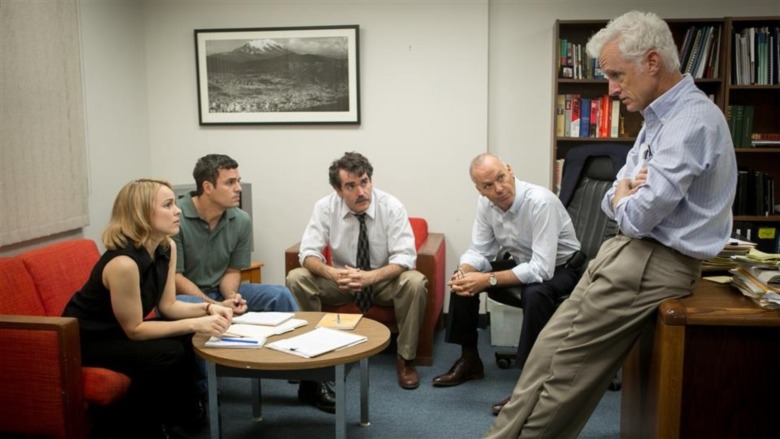BOSTON (MA)
Looper [New York NY]
April 19, 2021
By Mike Bedard
When you think of risky and hazardous careers, reporting the news might not top your list, but there’s more danger involved than you may think. Journalists obtain the facts on the important stories affecting our lives, and it doesn’t always come easily. It’s important to remember some of the most horrific scandals only came to light as a result of the hard-working women and men who make up our newsrooms.
This is the central idea behind 2015’s Spotlight, an Academy Award winner for Best Picture and Best Original Screenplay. The film features an extremely talented group of actors, including the likes of Mark Ruffalo, Rachel McAdams, and Michael Keaton, playing the journalists who uncovered a history of abuse within the Catholic Church. It’s difficult subject matter, especially when it focuses on the victims, but it shows the constant struggle between the power of journalism and the influence of the Catholic Church.
Thankfully, you can now watch one of the best films from the 2010s on Netflix. This is one movie audiences shouldn’t overlook, and it provides an exceptional template for how filmmakers can dramatize passive activities like researching and interviewing subjects.
Spotlight honestly looks at difficult material
Spotlight covers what seems like a straightforward investigation as it balloons into a massive conspiracy. The Spotlight team at The Boston Globe initially investigates one priest, but through that, they uncover a pattern of abuse that shows six percent of the priests in Boston alone have had abuse allegations lobbied against them. The movie follows the team as they chase one paper trail after another, and how the investigation impacts them on an emotional level as they dive deeper into the darkness.
There are plenty of movies out there about journalism, but many can sensationalize the finer details. They may resort to showcasing how journalists will bend the truth or resort to less-than-honest tactics to get the necessary information they require. In reality, those actions would create problems, but Spotlight doesn’t jazz up its story by making the reporters deceitful. Instead, the film creates tension in scenes that may not ordinarily call for it, such as when one of the journalists is reading old news stories.

It proved to be an effective tactic for film critics. Zach Schonfeld of Newsweek wrote, “Spotlight manages the seemingly impossible task of wooing journalists with authenticity while still elevating reporters to hero status, as they battle a formidable and corrupt institution with righteous determination.” It’s a must-watch film for cinephiles, and while there’s often a lot of debate about what movie truly deserves to win Best Pictures at the Oscars, few could argue that Spotlight is worthy of the mantle. It’s a story that can be dissected and discussed for years to come.
